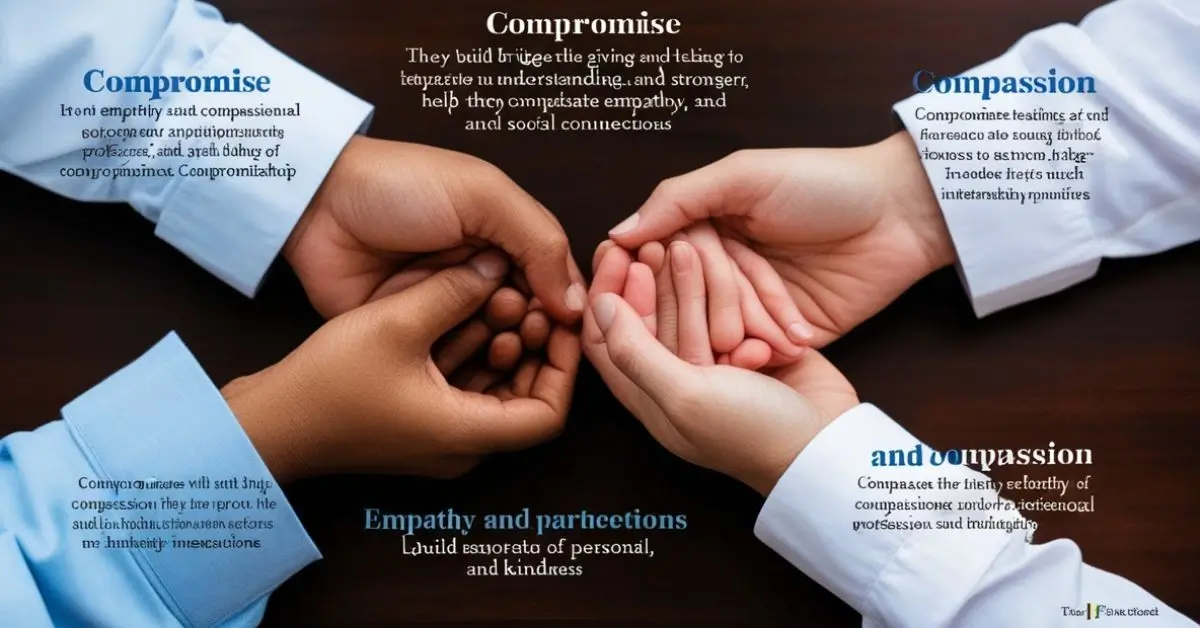In human interactions, two values stand out as essential for healthy and harmonious relationships: compromise and compassion. These principles, though distinct, often intertwine to help build bridges, foster understanding, and cultivate stronger personal, professional, and social connections. Compromise teaches the art of giving and taking, while compassion brings empathy and kindness into the equation. This article delves deep into the importance of these two values, how they work together, and their far-reaching impact on various aspects of life.
Defining Compromise
Compromise is the act of finding a middle ground between opposing viewpoints or interests. It is about making concessions, with both parties involved giving up something in order to reach an agreement that works for everyone. In many ways, it is a balancing act—neither side gets everything they want, but both sides get something they can accept. While the word “compromise” may sometimes carry a negative connotation, as though one is settling for less, it is actually one of the most vital tools for resolving conflicts and navigating disagreements.
Compromise is often seen as a sign of weakness, but in reality, it is a sign of strength. It requires humility, emotional maturity, and a willingness to prioritize long-term peace over short-term victory. Whether in personal relationships, workplaces, or international diplomacy, compromise prevents stalemates, fosters collaboration, and allows individuals and groups to move forward together.
The Essence of Compassion
Compassion, on the other hand, is the emotional response to the suffering or challenges of others, paired with the desire to alleviate that suffering. Unlike sympathy, which is merely feeling for someone, compassion involves a deeper connection that motivates one to take action. Compassion stems from empathy, which is the ability to put oneself in another’s shoes, but it goes beyond by inspiring an active response.
Compassion isn’t limited to personal relationships; it applies in all realms of life, from corporate settings to humanitarian work. Leaders who practice compassion foster a more inclusive and productive environment, while societies that emphasize compassion are more likely to create policies that support the well-being of all citizens, especially the most vulnerable.
The Interplay Between Compromise and Compassion
While compromise and compassion are distinct concepts, they often work hand in hand, especially in resolving conflicts. Compassion helps individuals understand the emotions, needs, and concerns of others, which makes it easier to reach a compromise. When two parties disagree, it’s usually because each is focused on their own perspective. However, when compassion enters the equation, people are more likely to listen, understand, and appreciate the other person’s viewpoint.
For example, in a marriage, a couple might disagree on how to spend their savings. One partner may want to invest in a home renovation, while the other might want to save for a family vacation. Without compromise, this conflict could escalate into resentment. However, if both partners approach the situation with compassion, they can better understand each other’s desires and emotions. One might say, “I know how much you’ve been dreaming of this vacation, and I understand why it’s important to you. But I’m also worried about our house needing repairs.” Acknowledging the other person’s feelings creates space for compromise—perhaps they could allocate part of their savings for the renovation and part for a more affordable vacation. This resolution is possible because both parties were willing to understand each other through compassion.
Compromise and Compassion in Personal Relationships
In personal relationships, compromise and compassion are essential for maintaining harmony and preventing conflicts from escalating. Whether between family members, friends, or romantic partners, relationships often involve differing opinions, desires, and needs. The ability to meet halfway and show empathy for one another can determine the longevity and quality of the relationship.
Marriage and Romantic Relationships
In romantic partnerships, conflict is inevitable. From disagreements over finances and parenting to differing values or lifestyles, couples are bound to face challenges. Compromise plays a pivotal role in resolving these issues. However, without compassion, compromise can become a transactional exchange rather than a heartfelt effort to maintain harmony.
Couples who practice compassion are better equipped to navigate compromises because they are motivated by the desire to understand their partner’s emotions and needs. Compassion fuels a sense of connection and shared purpose, making it easier to prioritize the relationship’s well-being over individual desires. For example, a partner who shows compassion during a disagreement about spending habits might not just compromise on the budget, but also empathize with their partner’s financial anxieties. In doing so, they foster a sense of safety and mutual support that goes beyond simply finding a middle ground.
Friendships
Friendships, too, benefit from a combination of compromise and compassion. Unlike romantic relationships, friendships often lack formal commitments, which means they are more vulnerable to misunderstandings or conflicts of interest. Compromise is key to maintaining these relationships, whether it’s deciding how to spend time together or resolving differences in communication styles.
Compassion strengthens friendships by promoting deeper emotional connections. Friends who show compassion are more likely to forgive mistakes, offer support during tough times, and be more understanding of each other’s flaws. When friends combine compassion with compromise, they create a bond that can withstand the inevitable ups and downs of life.
Compromise and Compassion in the Workplace
In professional settings, compromise and compassion are equally important. Whether in a corporate environment or a small business, team members often have different perspectives, goals, and ideas. A culture of compromise allows for better teamwork, as employees learn to work together toward shared objectives, even if it means letting go of personal preferences.
However, without compassion, compromise can feel forced or unfair, leading to dissatisfaction or resentment. Compassionate leaders and colleagues are more likely to foster an environment where compromise feels like a positive and collaborative process. For instance, a manager who shows compassion toward an employee’s work-life balance might be more willing to compromise on deadlines, resulting in a more motivated and productive team.
Additionally, compassion in the workplace leads to stronger emotional intelligence, which improves communication and reduces conflict. Employees who feel heard, understood, and supported are more likely to reciprocate, making it easier to resolve disagreements through compromise. In this way, compassion helps cultivate a more positive and cooperative work environment.
Compromise and Compassion in Society
At a broader societal level, compromise and compassion are essential for addressing social and political issues. In a world marked by increasing polarization, finding common ground has become more challenging yet more crucial than ever. Societies that embrace both values are better equipped to address complex issues like inequality, climate change, and healthcare.
Politics and Diplomacy
In the realm of politics, compromise is often necessary for governance, as elected officials must balance the needs and interests of various constituents. However, when political leaders lack compassion, their compromises may feel hollow or self-serving. Compassionate leadership, on the other hand, ensures that the needs of marginalized or vulnerable populations are considered when crafting policies.
International diplomacy also hinges on compromise and compassion. Whether negotiating peace treaties or trade agreements, diplomats must find ways to bridge differences between nations. Compassion plays a key role in these negotiations, as it fosters mutual respect and understanding, which can lead to more lasting and meaningful compromises.
Compassionate Policy-Making
Compassionate societies are more likely to create policies that benefit all citizens, especially those who are most in need of support. Social safety nets, healthcare access, and environmental protections are often the result of leaders and citizens who prioritize the well-being of others. Compromise comes into play as these policies are negotiated and refined to meet the diverse needs of the population.
Challenges to Compromise and Compassion
Despite their importance, both compromise and compassion face significant challenges in today’s fast-paced, individualistic world. Modern culture often promotes self-interest and competition over collaboration and empathy. The rise of social media has amplified this trend, as online platforms encourage debate, division, and polarization, rather than understanding and compromise.
One challenge to compromise is the perception that it involves weakness or defeat. Many people resist compromise because they fear it means conceding too much or losing face. In reality, compromise is a strength because it requires emotional intelligence, patience, and a long-term vision.
Compassion also faces challenges, particularly in cultures that emphasize individual success and self-reliance. People may struggle to show compassion if they feel overwhelmed by their own challenges or if they believe that others are responsible for their own suffering. Additionally, the digital age has created a sense of distance between individuals, making it easier to dehumanize or dismiss the struggles of others.
Cultivating Compromise and Compassion in Daily Life
While the challenges are real, both compromise and compassion can be cultivated through intentional practice. Here are a few strategies for incorporating these values into daily life:
- Active Listening: One of the most effective ways to foster both compromise and compassion is through active listening. This involves fully focusing on what the other person is saying, without interrupting or formulating a response while they are speaking. Active listening helps create a space for empathy and understanding, making it easier to find common ground.
- Perspective-Taking: Compassion can be cultivated by actively imagining yourself in another person’s situation. When you take the time to consider what someone else is feeling or experiencing, you are more likely to respond with empathy and understanding.
- Practicing Patience: Compromise requires patience, especially when both sides are deeply invested in their own positions. Taking the time to understand the other person’s perspective, rather than rushing to defend your own, can lead to more productive and meaningful compromises.
- Setting Boundaries: While compromise involves giving up something, it is important to set boundaries to ensure that you are not compromising too much of your own well-being or values. Compassion for yourself is just as important as compassion for others.
- Choosing Collaboration Over Competition: In both personal and professional settings, shifting from a competitive mindset to a collaborative one can help foster both compromise and compassion. Instead of viewing disagreements as battles to be won, approach them as opportunities to work together toward a shared goal.
Conclusion
Compromise and compassion are two of the most important values for building and maintaining healthy relationships, whether on a personal, professional, or societal level. Together, they help individuals and groups navigate conflicts, foster understanding, and create solutions that work for everyone involved. While both values face significant challenges in today’s fast-paced, competitive world, they can be cultivated through intentional practice. By prioritizing compromise and compassion, we can create more harmonious relationships and a more compassionate world.











